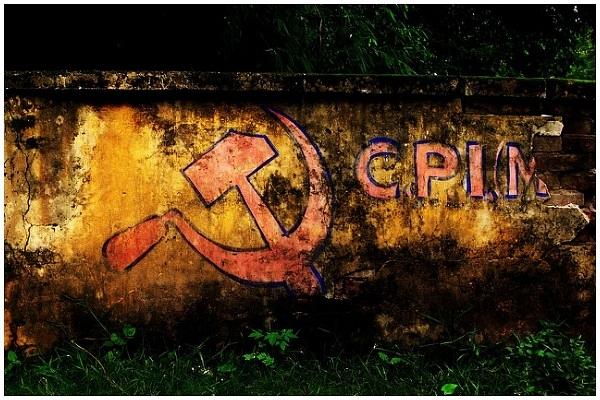
CPI(M) Editorial Blames India For Ongoing Border Dispute With China
The CPI(M)’s stand in favour of China, nuanced as it may be, is nothing new.
Right from 1947, India’s communists have placed the interests of their foreign masters above that of their own country.
The Communist Party of India (Marxist) has come out in nuanced and covert support of China once again.
In an editorial published in a recent edition of party mouthpiece Peoples Democracy, the CPI(M) has said that India is to blame for the flare-up along the Line of Actual Control (LAC).
“Whatever egregious actions by China, the positions adopted by the Government of India have also contributed to such a situation developing,” the editorial stated.
Accusing India of overlooking China’s concerns over the dismantling of the erstwhile state of Jammu & Kashmir into two Union Territories, the CPI(M) said that political grandstanding by Union ministers and India’s perceived shift towards a strategic alliance with the USA were responsible for China’s actions along the LAC.
The editorial went on to say: “During the current pandemic, India was seen going along with the United States in its diplomatic efforts to corner China at the World Health Assembly. A Union minister echoed the charge of the United States that the coronavirus was produced in a laboratory in China”.
Coming down heavily on “jingoistic cries for revenge and military retaliation” by Indians after the Chinese perfidy at Galwan on 15 June, the CPI(M) mouthpiece said that those voices need to be “dismissed outright” and added that “no sensible person, of whatever political persuasion, can subscribe to such an unrealistic and immature response”.
The editorial refers to Nepal’s claims over some parts of Uttarakhand (Lipulekh, Limpiyadhura and Kalapani) and says the (Union) government should ask itself why India’s troubles with neighbouring countries are increasing.
It adds: “Bangladesh is increasingly discomfited by constant official rhetoric against Bangladeshi infiltrators and the CAA-NRC design to deport these ‘termites’ to Bangladesh”.
The CPI(M) tries to gloss over China’s evil designs and Beijing’s encouragement to Nepal to claim Indian territory.
“To dismiss all this as part of some design by China is self-delusionary. The fact is, the ultra-nationalist Hindutva world view of the BJP-RSS is having its fall-out on our relations with the South Asian countries,” the CPI(M) mouthpiece says.
Dismissing the contention by analysts that China is indulging in ‘salami-slicing’ on the border with India, the CPI(M) comes out as an ardent defender of Beijing and says “there are deeper reasons” for the fracas on the border.
The Marxist party then elaborates on the ‘deeper geo-political factors’ saying: “The steps to dismantle the state of Jammu & Kashmir and break it up into two centrally-administered territories of Jammu & Kashmir and Ladakh have had external repercussions. China saw it from their own standpoint.”
“The Chinese government protested twice to India that for them, this amounted to changing of an administrative arrangement, which has an impact on an area to which China has claims. But the Indian government overlooked this response even when China got the matter raised in an informal session of the United Nations Security Council”.
The CPI(M) thus suggested that India should have heeded China’s objections and restored Jammu & Kashmir’s status as a full-fledged state. It also validated China’s claims on Ladakh by acknowledging that “China has claims” to that Union Territory.
The Marxists also blame “political grandstanding” by Union Home Minister Amit Shah and Foreign Minister S. Jaishankar for China’s diabolic actions along the LAC. It referred to Shah’s statement in Parliament on 6 August that Pakistan-occupied Kashmir and Aksai Chin are part of India.
Jaishankar’s statement at a press conference in September last year that India would have “physical jurisdiction of PoK one day” was also criticised by the CPI(M).
And in doing so, it went against India’s long-standing and oft-articulated position that PoK (which Pakistan continues to occupy illegally) and Aksai China (which Pakistan gifted to China illegally) are an integral part of India.
Another reason for China’s belligerence against India, says the CPI(M), is the Modi government’s “speedy steps to integrate India with the Indo-Pacific strategy of the United States” which, it adds, is “a plan which is meant to counter China”.
“In September last year, the quadrilateral alliance taking shape between the United States, India, Japan and Australia got upgraded to the ministerial level when the foreign ministers of the four countries met in New York on the sidelines of the UN General Assembly session,” the editorial noted.
Calling for a “recalibration” of India’s strategic approach to China, the editorial endorsed the prescription of the former national security advisor, M.K. Narayanan, that “India should adopt a non-aligned posture on the US-China conflict”.
“This is sage advice, contrary to what the growing chorus of pro-Western strategic experts and lobbyists are demanding. The Modi government, steeped as it is in America’s Indo-Pacific strategy and a burgeoning military and strategic relationship, should consider whether ganging up against China will serve our interests,” the Marxist mouthpiece said.
The CPI(M)’s stand in favour of China, nuanced as it may be, is nothing new. Right from 1947, India’s communists have placed the interests of their foreign masters above that of their own country.
In 1947, communists denounced India’s independence as “false” (jhoothi azadi) and instigated armed insurrections against the Indian state in Tamil Nadu, Andhra Pradesh and Kerala.
It was only when Stalin realised in 1950 that Nehru could become an ally of the USSR that India’s communists reversed their call for an “armed opposition to overthrow the Indian state”.
The undivided CPI and then its two derivatives — the CPI and CPI(M) — were well-known for taking orders from Moscow and Beijing (read this declassified CIA document).
During the Chinese aggression in 1962, the undivided CPI (the split in communist ranks happened in 1964) adopted a pro-China position and held that even donating blood to Indian jawans or raising funds for the country’s war effort was ‘anti-communist’ (read this, this and this).